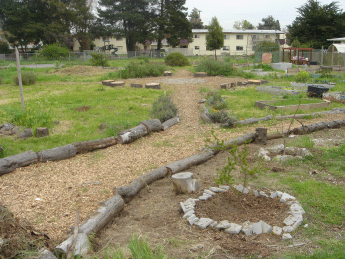Senior Project
In order to receive my Interdisciplinary Studies B.A. in Permaculture at Humboldt State University, California, I needed to complete a senior project synthesizing the focus areas of my major. Permaculture integrates the disciplines of soils, alternative agriculture methods, appropriate technologies, and ethics, specifically environmental ethics. Permaculture is, in its’ theories, ethics, and philosophies, an interdisciplinary study. Permaculture is not simply a gardening or agricultural system, but a way to observe and learn from nature and incorporate it into our lives and our landscapes. It is a way to see interconnectedness in the relationships between plants, animals, others and ourselves.
In order to show the interrelatedness of my three areas, (environmental
ethics, appropriate technology, and soils and alterative agriculture)
I worked with the Alameda Point Collaborative (APC). This is an organization
for the homeless residents of Alameda County. The APC has a four-acre
community garden for its residents. In the garden and surrounding area,
the supervisors of the APC have chosen to use permacultural principles
in an attempt to connect its residents with the land and empower them
thru community building and gardening.
At the APC, I helped to set up a children’s garden to be used in the after-school program. I also taught two groups of kids about composting and we also made worm bins. With some help from a few residents, I made a large herb spiral in the garden, as well as planted dozens of fruit trees. This Website is a collection of pictures, a simple guide to teaching kids about composting and worms, and instructions on building an herb spiral.
Permaculture Background Information
“Permaculture (permanent agriculture) is the conscious design and
maintenance of agriculturally productive ecosystems, which have the diversity,
stability, and resilience of natural ecosystems. Permaculture design is
a system of assembling conceptual, material and strategic components in
a pattern which functions to benefit life in all forms. The philosophy
of permaculture is one of working with, rather than against, nature.”
-Bill Mollison in Permaculture: A Design Manual
Prime Directive
The only ethical decision is to take responsibility for our own existence
and that of our children.
Permaculture has three main tenants to its Ethical Basis:
1. Care of the earth
2. Care of people
3. Sharing of surplus
From this directive and these tenants, comes a set of design guidelines. One of these simple guidelines is that each “element of the design should perform several functions.” (Mollison, 1988) An easy example of this principle can be found in the children’s garden. The main function is to grow food, but in that process, the children have the opportunity to learn about how plants grow, what the plants need to survive, and how compost and worms help the plants grow. Once the food is grown, they have the opportunity to eat healthy and nutritious food and can even learn how to prepare it during one of the APC’s kid’s cooking classes. Possibly the most important function are the lessons that the children can learn about nature and lifecycles, while at the same time learning about patience, responsibility, and pride in growing your own food.
Alameda Point Collaborative Background Information
The Alameda Point Collaborative is an umbrella organization of several
homeless service providers. It began in 1995 when the Alameda Reuse and
Redevelopment Authority adopted the Community Reuse Plan. Among other
things, this plan set out to address the problems associated with Alameda
County’s homeless population. The APC was granted 34 acres of a
recently closed naval base on Alameda Point. There are 239 housing units
with nearly 500 residents, over half of which are under eighteen. It has
a community center, community garden, a large childcare program, and other
facilities. It offers affordable housing and hires a minimum of 15% of
its residents. There are five main homeless housing developers that make
up the APC, including: United Indian Nations, Resource for Community development
(HIV/AIDS positive and survivors domestic violence), San Leandro Shelter
for Women and Children, Operation Dignity (homeless veterans), and Dignity
Housing West. One of the main goals of the APC is to maximize the resources
available to homeless people. They offer a variety of services that include,
drug and alcohol counseling, mental health services, life skills education,
childcare and youth programs, employment training and placement, transportation,
and primary health care.
The area around the former naval base was primarily a lower income African
American community, most of whom rented their living spaces. Much of what
used to be the naval base, with the exception of the Collaborative’s
land, will be developed in to a residential area with new homes ranging
from $800,000 to $1,000,000. One of the APC’s goals is to attempt
to build community in this area with radically different economic classes
across the street from one another. The community garden is open to all
neighborhood residents not just the APC’s residents.
References
http://www.apcollaborative.org
http://www.alamedahousing.com/projects.html
http://www.thesteward.net/politics/hcdp01.html
http://www.arcecology.org/alameda.shtml
 View
from the Community Garden Entrance View
from the Community Garden Entrance |
| Herb Spiral | Worm Bins | Fruit Trees | Children's Garden |